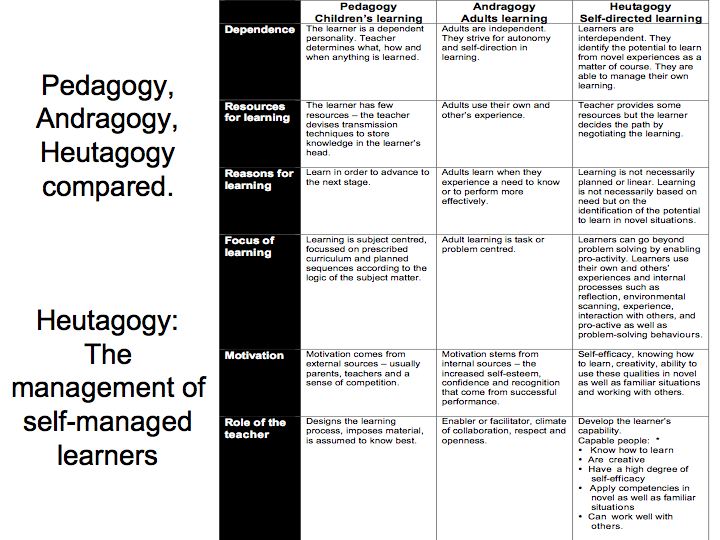Adult Learning and Andragogy
 You hear the term "pedagogy" fairly often in education. It literally means "leading children" and is usually defined as the art or science of teaching children. Though it is studied and used from pre-school through college, the term "andragogy" is not as well known as it should be.
You hear the term "pedagogy" fairly often in education. It literally means "leading children" and is usually defined as the art or science of teaching children. Though it is studied and used from pre-school through college, the term "andragogy" is not as well known as it should be.
Andragogy was a term coined to refer to the art/science of teaching adults. Malcolm Knowles and others theorized that methods used to teach children are often not the most effective means of teaching adults. In The Modern Practice of Adult Education (1970), Knowles defined andragogy as "an emerging technology for adult learning."
Knowles arrived at 4 andragogical assumptions:
1) He felt that adults move from dependency to self-directedness;
2) draw upon their reservoir of experience for learning;
3) are ready to learn when they assume new roles; and
4) want to solve problems and apply new knowledge immediately.
Though many people still consider andragogy to be the adult version of pedagogy, more recently it is sometimes considered to be an alternative to pedagogy. In that newer view, andragogy is viewed as a more learner-centered/directed approach to learning for people of all ages.
This view doesn't necessarily mean that all the studies done on pedagogy are invalid, but the sense that it is more of a teacher-centered or directive style of learning started to fall out of favor in the last three decades., and andragogy as "learner-centered/directed."
In my first encounter with andragogy in a workshop, I recall the presenter saying that while adult learners can learn when presented with theory presented before practices, children have little tolerance for learning theory when they haven't seen it in practice. Of course, anyone who has taught adults for a few years will tell you that some adults seem to learn better when treated as children.
If you are teaching at the college level, you can be considered to be at the edge of child and adult learning, especially if you still consider age 21 to be the entry point of adulthood. But since we are seeing fewer traditional fresh-from-high-school freshman and more over-21 undergraduates, adult learning is a greater concern. This is especially true in online education.
Andragogical principles that should be considerations in designing courses are based on studies of how and when adults learn most effectively.
Adults generally learn best when:
- They feel the need to learn
- They have some input into what, why, and how they learn
- Their schedule and learning styles are taken into account.
- Course learning objectives are based on the learners' needs and interests based on prior evaluation.
- To obtain objectives, there are sequential activities
- The learning’s content and processes have a meaningful relationship to their past experience.
- Their experience is used as a learning resource in the course.
- The course content relates to the individual’s current life situation and tasks.
- They have as much autonomy as possible
- The learning climate minimizes anxiety
- Freedom to experiment is encouraged
Of course, I believe children can benefit from some of these andragogical principles too.

